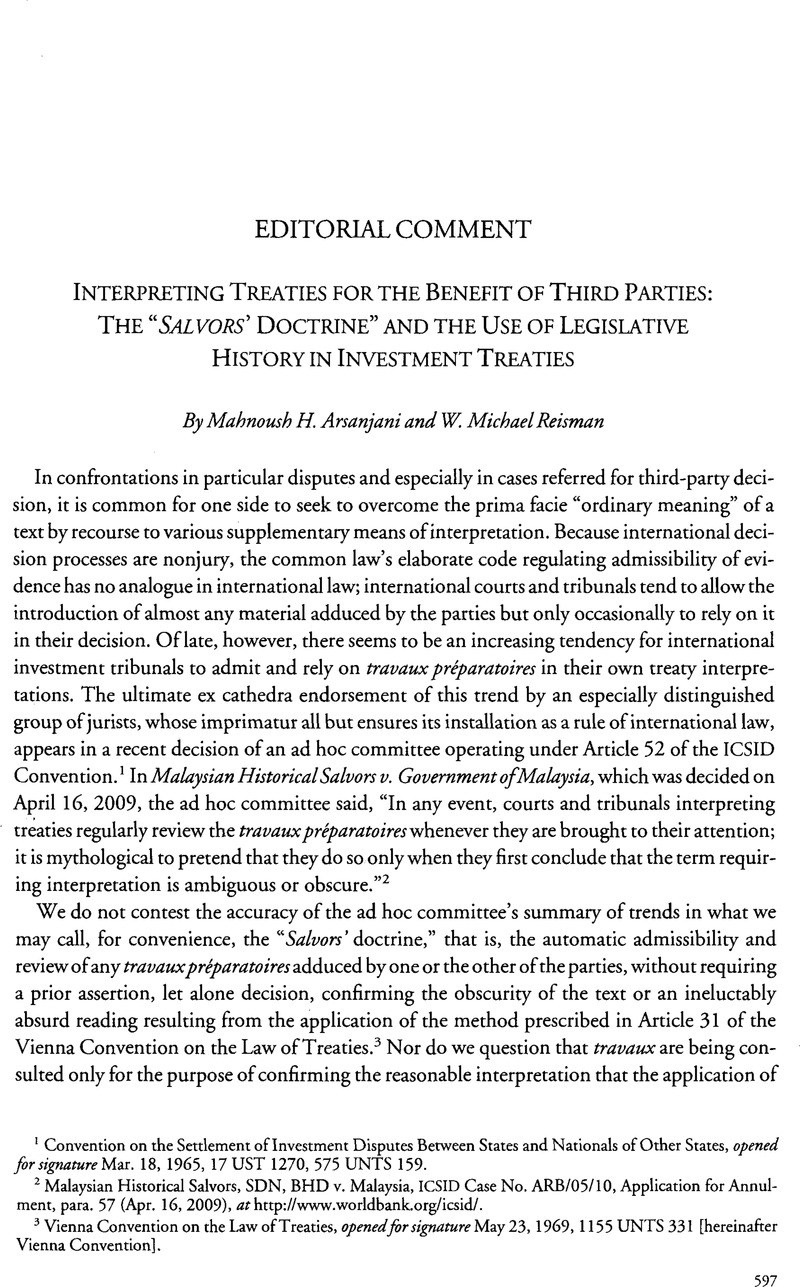Article contents
Interpreting Treaties for the Benefit of Third Parties: The “Salvors” Doctrine” and the Use of Legislative History in Investment Treaties
Published online by Cambridge University Press: 27 February 2017
Abstract

- Type
- Editorial Comment
- Information
- Copyright
- Copyright © American Society of International Law 2010
References
1 Convention on the Settlement of Investment Disputes Between States and Nationals of Other States, opened for signature Mar. 18, 1965, 17 UST 1270, 575 UNTS 159.
2 Malaysian Historical Salvors, SDN, BHD v. Malaysia, ICSID Case No. ARB/05/10, Application for Annulment, para. 57 (Apr. 16, 2009), at http://www.worldbank.org/icsid/.
3 Vienna Convention on the Law of Treaties, opened for signature May 23, 1969, 1155 UNTS 331 [hereinafter Vienna Convention],
4 See, in this regard, Schwebel, Stephen M., May Preparatory Work Be Used to Correct Rather Than Confirm the “Clear” Meaning of a Treaty Provision? in Theory of International Law at the Threshold of the 21st Century: Essays in Honour of Krzysztof Skubiszewski 541 (Makarczyk, Jerzy ed., 1996)Google Scholar.
5 It appears that the availability and accessibility of travaux préparatoires, whenever possible, has been the main encouragement for litigants to cite and quote in support of their positions and for the tribunals to respond to them.
6 The tribunal in Amco v. Indonesia held that “to protect investments is to protect the general interest of development and of developing countries.” Amco Asia Corp. v. Republic of Indonesia, ICSID Case No. ARB/81/1, Decision on Jurisdiction, para. 23 (Sept. 25,1983), reprinted in 23 ILM 351,369 (1984), 1 ICSID Rep. 389,400 (1993).
7 Vienna Convention, supra note 3, Art. 31(1).
8 Id., Art. 31(2).
9 In its commentary to this provision, the International Law Commission stated:
Once it is established—and on this point the Commission was unanimous—that the starting point of interpretation is the meaning of the text, logic indicates that ‘the ordinary meaning to be given to the terms of the treaty in their context and in the light of its object and purpose’ should be the first element to be mentioned.
Report of the International Law Commission on the Work of Its Eighteenth Session, [ 1966] 2 Y.B. Int’l L. Comm’n 173, 220, para. 9, UN GAOR, 21st Sess., Supp. No. 9, UN Doc. A/6309/Rev.l (1966).
10 Vienna Convention, supra note 3, Art. 32.
11 Arbitral Award of 31 July 1989 (Guinea-Bissau v. Sen.), 1991ICJ REP. 53, 69, para. 48 (Nov. 12) (quoting Competence of Assembly Regarding Admission to the United Nations, Advisory Opinion, 1950 ICJ REP. 4, 8 (Mar. 3)).
12 Id. at 69~70 (quoting South West Africa (Eth. v. S. Afr.; Liber, v. S. Afr.), Preliminary Objections, 1962 ICJ REP. 319, 336 (Dec. 21)).
13 See Methanex Corp. v. United States, First Partial Award on Jurisdiction and Admissibility, paras. 19–21 (NAFTA Ch. 11 Arb. Trib. Aug. 7, 2002), at http://www.state.gov/s/l/c5818.htm.
14 Every legal creation inevitably incorporates the legal-cultural assumptions of its time. In our view, Article 32 of the Vienna Convention reflects some treaty drafting and implementation assumptions that no longer obtain. With the increasing number of treaties that have been drafted in recent decades, and, of them, the large number assigning actionable rights to third parties that did not participate in drafting the treaties, the utility of travaux préparatoires may be declining. We propose to take this question up in a later piece.
15 Letter from Lawrence, T. E. to Lionel, Curtis (Dec. 22, 1927)Google Scholar, in The Letters of Lawrence, T. E. 559 (David, Garnett ed., 1938)Google Scholar. We thank Professor Stephen Tabachnick for helping us find this letter.
16 For example, many of the documents circulated at the European Energy Charter Conference leading to the adoption of the Energy Charter Treaty on December 17, 1994, at Lisbon are not publicly available. The documents are held at the ECT headquarters in Brussels. States parties have access to them, but private parties do not. While these documents were circulated to the participating governments, there is no certainty that all the governments kept copies of them for either their own use or that of their own investors.
17 See Gardiner, Richard K., Treaty Interpretation 333-34 (2008)Google Scholar (discussing WTO Panel Report, United States—Safeguard Measures on Imports of Fresh, Chilled or Frozen Lamb Meat from New Zealand and Australia, paras. 7.110 –.114, WT/DS177/R, WT/DS178/R (adopted May 16, 2001)).
- 13
- Cited by




